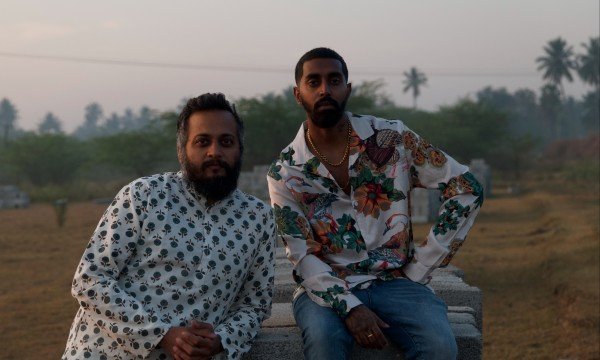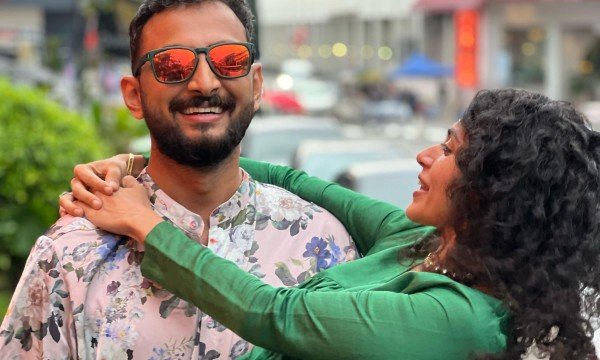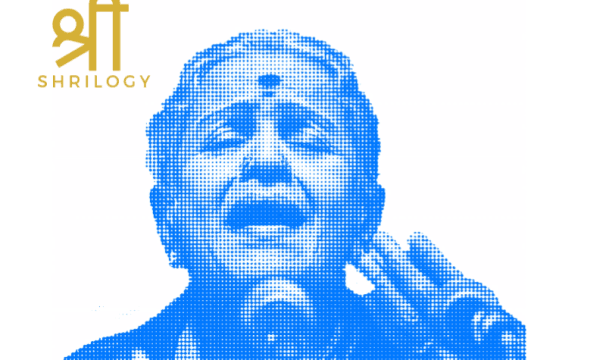
In 2018, Yung Raja released his debut single, "Poori Gang," proclaiming, “Thambi Raja 80,000 feet with the turbulence.” Since then, Yung Raja's career has skyrocketed, making him the first Tamil artist to perform at Rolling Loud, open for 50 Cent, and collaborate on a single with Snoop Dogg. He has achieved numerous other feats, such as being named in Forbes 30 Under 30, performing on the same stage as Travis Scott, and being acknowledged by American TV host Jimmy Fallon.
As a Singaporean-Tamil rapper, Yung Raja blends Tamil and English in his music, Tanglish. Yung Raja's journey reflects his fusion of East and West, bridging cultural divides and empowering others to embrace their identities. Through his music, he's become a global representative of Tamil culture, challenging stereotypes and inspiring a new generation of artists.
In our interview, he shared insights into his background, influences, and challenges while emphasizing the importance of staying true to oneself. Keep reading to learn how Yung Raja stayed true to his roots while achieving remarkable feats in the mainstream as a Singaporean-Tamil rapper.
“What inspired you to become a rapper?”
Yung Raja explained that he comes from a typical Tamil-Muslim immigrant family in Singapore. His parents immigrated from Thanjavur, Tamil Nadu, to Singapore in 1992, and he was born in 1995, making him the first-generation Singaporean Tamil boy in his family.
Yung Raja shared that he spoke English with his multicultural friends outside his home. However, at home, he was immersed in Tamil traditions, language, and customs. As a result, Tamil culture was deeply integrated into his identity.
Yung Raja’s earliest exposure to music was through Tamil cinema, which profoundly influenced him. At the age of 10, Yung Raja secretly listened to Eminem on his sister’s Walkman, which sparked an enduring fascination with hip-hop, causing him to fall in love with the raw beats and rhymes—opening the floodgates for him to find and listen to more hip-hop artists.
“Throughout my teenage years, I was simultaneously influenced by two distinct yet influential worlds—the Tamil culture I was raised in and the American hip-hop culture that captivated me.”
Yung Raja explained how the fusion of these influences shaped his identity and sparked his passion for music. One day, his best friend suggested they try rapping while fusing Tamil and English languages because Yung Raja felt like both cultures were stitched into his identity, and he wanted to share this identity through music. This led to the creation of “Poori Gang,” for which Yung Raja received numerous positive recognitions, one being from M.I.A.
“Despite my initial insecurities and uncertainties, the positive reception fueled my confidence.”
I asked Yung Raja, “How do you believe your music contributes to the representation and recognition of Tamil culture on a global stage?”
Yung Raja explained that although he grew up in a strict traditional Tamil household, his music is unconventional, blending genres of punk and edgy vibes infused with the Tamil language and culture. “This unique fusion reflects my authentic self as a Singaporean Tamil.”
Yung Raja observed a common reluctance among Tamilians, particularly those raised outside Tamil Nadu, to embrace their cultural identity fully, especially at a younger age. Despite Tamil culture and cinema playing an integral role in many people's upbringing, individuals tend to avoid showcasing this culture on mainstream platforms. However, as people grow older, they begin to find pride in their Tamil cultural identity, especially in today’s time, with the Tamil culture now penetrating mainstream conventions.
“As an artist, my journey has been about self-expression and authenticity. Hip-hop ethos taught me to celebrate my true self, and my music reflects my bilingual upbringing.”
Over the years, Yung Raja realized that his most authentic voice resonates with Tamil people worldwide, empowering them to celebrate their identity. His music inadvertently became a platform for cultural representation, bridging the gap between the Tamil diaspora and a global audience.
Yung Raja shared how his journey as a Tamil rapper from Singapore has given him unique opportunities to work with major brands like Gucci and collaborate with influential figures in the industry. Through his brand affiliation, Yung Raja has become a representative of Tamil culture on a global stage, challenging stereotypes and paving the way for a new generation of artists.
“This journey has made me realize the importance of embracing our cultural heritage while carving out our space in the global creative landscape. It's a journey of self-discovery, empowerment, and celebration—one that transcends borders and unites us as proud Tamilians globally.”
I asked, “What does being Tamil mean to you?”
Yung Raja said, “It’s in our DNA. You can't deny it. It's a part of who you are.” He explained that every Tamil from the same era, no matter where they are geographically, grew up similarly, watching Rajinikanth movies, eating rice with their hands, and wearing cultural clothing, stating that everyone shared a parallel upbringing.
“It's about the amalgamation of traditions, culture, language, everything that makes us Tamil. It's so deeply ingrained in us, down to our DNA. Being Tamil means it's in our blood. We can go anywhere and still feel connected to our culture. There's something uniquely special about being Tamil beyond language, movies, and songs. It's the essence of who we are, connecting everything, creating that unique Tamil experience.”
I asked Yung Raja, “Tell me about some challenges you’ve faced in your journey.”
Yung Raja shared that he often felt deeply insecure and uncertain when he started. He explained how, although doubt is something we all grapple with at times, his biggest challenge was the lack of reference points.
“I could only draw inspiration from those I admired, whom I could categorize into two distinct groups—aligning with the worlds of East and West. For example, Yogi B is from the Tamil world, and Eminem is from the West. These two worlds shaped my influences, but I struggled to find my place between them.”
Yung Raja would experiment with different styles of expression, from full English rap to full Tamil lyrics, but neither felt authentic. “It wasn't until I started blending Tamil and English seamlessly that I found my voice. This fusion reflected my upbringing and cultural identity.”
Realizing that his artistry had to reflect the blend of East and West was a pivotal moment for Yung Raja, allowing him to embrace his unique identity and propel him forward in his artistic journey.
Yung Raja shares that he was trying to pioneer something so original that it felt like swimming against the current. From the Tamil community’s perspective, he didn’t feel immediately accepted, explaining how some viewed him as an outsider. “I felt like I had to prove myself, carve out a space that didn't exist before.”
Yung Raja explains that gaining acceptance as a Singaporean Tamil artist took years. “I come from a minority race in Singapore, further narrowing my niche within a niche. The odds seemed unconquerable. But despite the challenges, I persisted, driven by my passion to break boundaries and challenge norms.”
I concluded the interview by asking, “What message would you like to leave with your readers, especially those who find inspiration in your music?”
Yung Raja explained that understanding the beauty of his identity, Tamil roots, and lineage has allowed him to accept and embrace himself in ways he could never imagine. This realization results from being an artist whose culture and roots are deeply ingrained in the art itself.
Yung Raja’s deep appreciation and respect for his Tamil DNA render the message, “For anyone listening to this, I would love for my work and words to inspire them to want to accept and embrace themselves, to be proud of who they are and what they are, not just on the surface level, but deep down to their core. It's about really appreciating and being grateful for it.
You need to know where you came from to know where you're going. Understanding my Tamil identity has been one of the most meaningful learning experiences in these last seven years, beyond the music journey.
If I can inspire another person to embrace themselves in the deepest way possible, that would be one of the main takeaways.”
 Exploring the Musical Alchemy of Tamil Artists Yanchan Rajmohan and Sandeep Narayan: A Deep Dive into Their Album 'Arul' - A Fusion of Carnatic and Hip-Hop Yanchan and Sandeep have transformed Carnatic music, offering a fresh rendition that incorporates multiple musical genres in an accessible way. TamilCulture.com
Exploring the Musical Alchemy of Tamil Artists Yanchan Rajmohan and Sandeep Narayan: A Deep Dive into Their Album 'Arul' - A Fusion of Carnatic and Hip-Hop Yanchan and Sandeep have transformed Carnatic music, offering a fresh rendition that incorporates multiple musical genres in an accessible way. TamilCulture.com














 Canada
Canada












